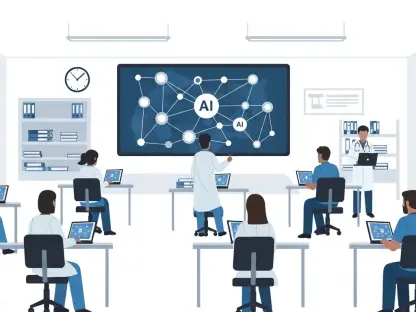In a landscape where healthcare demands are skyrocketing, consider the staggering reality that hospitals now manage millions of connected devices, from patient monitors to telehealth platforms, generating an unprecedented volume of data daily. This surge in digital dependency has placed immense pressure on traditional networking systems, often leading to delays in critical care and operational inefficiencies. As healthcare facilities strive to meet the needs of patients and staff alike, the adoption of cutting-edge connectivity solutions has become a pressing priority, paving the way for transformative technologies like 5G to redefine the industry.
The Digital Transformation of Healthcare
The healthcare sector stands at a pivotal juncture, with digital solutions becoming integral to delivering quality care. Hospitals and clinics are increasingly reliant on electronic patient records, telehealth services, and an array of connected medical devices to streamline operations and enhance patient outcomes. This shift toward digitization has not only improved accessibility but also amplified the need for robust, high-speed connectivity to manage the vast data flows that underpin modern medical practices.
Connectivity now serves as the backbone of healthcare facilities, enabling seamless communication between devices, staff, and patients. The ability to access real-time data through electronic records or conduct virtual consultations via telehealth platforms hinges on reliable networks. Without advanced infrastructure, these systems risk faltering, potentially compromising patient care and administrative efficiency in high-stakes environments.
Key industry players, such as Verizon and Ericsson, are stepping up to address these challenges by providing advanced networking technologies tailored to healthcare needs. Their contributions are vital in supporting the operational demands of hospitals, from managing device-heavy environments to ensuring uninterrupted service. As digital transformation accelerates, the role of such technologies in shaping responsive and efficient healthcare systems cannot be overstated.
Verizon’s 5G Solutions: A Game-Changer for Healthcare
Neutral Host and Private 5G Networks Explained
Verizon’s innovative approach combines Neutral Host and Private 5G Networks to cater to the dual connectivity needs of healthcare settings. Neutral Host Networks function by providing seamless public access, ensuring that patients, visitors, and staff can connect to mobile networks effortlessly without manual intervention. This creates a user-friendly experience akin to public Wi-Fi but with greater reliability and coverage across hospital campuses.
In parallel, Private 5G Networks deliver secure, high-performance connectivity dedicated to clinical and operational functions. These networks offer low latency and enhanced bandwidth, crucial for supporting sensitive tasks like real-time data transmission and secure communication among medical staff. By segregating public and private traffic, Verizon ensures that critical healthcare operations remain unaffected by general usage spikes.
The applications enabled by these networks are vast and transformative, ranging from smart hospital beds that monitor patient vitals to real-time asset tracking for medical equipment. Such technologies depend on the robust infrastructure provided by 5G to function effectively, reducing response times and improving resource management. This dual-network model positions healthcare facilities to embrace innovation while maintaining security and efficiency.
Market Adoption and Growth Potential
Adoption of Verizon’s 5G solutions is gaining momentum among prominent healthcare providers, with institutions like AdventHealth and Tampa General Hospital leading the charge. These organizations have recognized the value of enhanced connectivity in addressing their complex needs, from supporting high device density to ensuring smooth operations across sprawling campuses. Their early implementation serves as a benchmark for others in the industry.
Driving this adoption is the exponential increase in data volume and the proliferation of connected devices within healthcare environments. As hospitals integrate more technology into daily operations, the demand for networks capable of handling such loads without bottlenecks has surged. Verizon’s solutions meet this demand by offering scalable infrastructure that can adapt to growing data requirements over time.
Looking ahead, the scalability of these 5G networks promises to shape the future of healthcare innovation. From supporting facility expansions to enabling emerging technologies, the potential for growth is significant. Analysts predict that continued investment in such solutions will likely redefine care delivery models, making them more data-driven and responsive to patient needs in the coming years.
Challenges in Implementing Advanced Connectivity Solutions
Deploying 5G technologies in healthcare settings is not without obstacles, as many facilities grapple with outdated infrastructure that struggles to support modern demands. Upgrading these systems often requires substantial financial investment, posing a barrier for smaller institutions or those with limited budgets. This challenge of cost can delay the transition to advanced networks, even when the benefits are clear.
Technical hurdles also complicate implementation, particularly the integration of new 5G networks with existing systems. Ensuring compatibility and maintaining uninterrupted service during deployment are critical concerns, as any downtime can directly impact patient care. Healthcare providers must navigate these complexities carefully to avoid disruptions in their day-to-day operations.
Strategic partnerships with technology providers like Verizon offer a pathway to overcome these challenges. By leveraging expertise and resources, hospitals can adopt phased rollouts that minimize disruption while gradually enhancing connectivity. Such collaborative approaches help balance the immediate costs with long-term gains, ensuring a smoother transition to cutting-edge network solutions.
Regulatory and Security Considerations in Healthcare Networking
Navigating the regulatory landscape is a critical aspect of adopting advanced connectivity in healthcare, where compliance with standards like HIPAA remains non-negotiable. These regulations mandate strict protocols for handling patient data, requiring networks to prioritize security and privacy at every level. Failure to adhere to such guidelines can result in severe penalties and loss of trust among stakeholders.
Private 5G Networks play a pivotal role in addressing these security concerns by offering dedicated, encrypted channels for sensitive information. Unlike public networks, these private systems limit access to authorized personnel, safeguarding patient records and other critical data from potential breaches. This level of protection is essential in maintaining confidence in digital healthcare solutions.
Verizon’s offerings align closely with regulatory requirements, embedding security features that support compliance while enabling efficient operations. This alignment not only mitigates risks but also enhances the ability of healthcare providers to focus on care delivery without constant worry over data vulnerabilities. As a result, such solutions are becoming a trusted choice for institutions aiming to balance innovation with legal obligations.
The Future of 5G in Healthcare
The horizon for 5G in healthcare is brimming with possibilities, as these networks are poised to support groundbreaking trends like AI-driven diagnostics and remote surgeries. Such advancements rely on ultra-low latency and high bandwidth to process complex data in real time, potentially transforming how medical professionals diagnose and treat patients across distances.
Market disruptors, including consumer demand for superior connectivity, are also influencing hospital investments in 5G infrastructure. Patients and visitors increasingly expect seamless access to digital services during their time in healthcare facilities, pushing administrators to prioritize network upgrades. This demand acts as a catalyst for broader adoption of advanced technologies across the sector.
Global economic conditions and ongoing innovation will further shape the trajectory of 5G integration in healthcare. While economic fluctuations may impact funding for large-scale projects, the continuous push for technological advancement ensures that solutions like Verizon’s remain in focus. As partnerships and research evolve, the widespread implementation of 5G is expected to accelerate, setting new benchmarks for care quality and operational excellence.
A Connected Future for Healthcare
Reflecting on the journey, the integration of Verizon’s 5G Neutral Host and Private Networks marked a turning point for the healthcare sector, addressing both immediate connectivity gaps and long-term operational needs. The tangible improvements witnessed at facilities like AdventHealth and Tampa General Hospital underscored the profound impact on patient care and efficiency. Moving forward, healthcare leaders should prioritize strategic investments in scalable network solutions, fostering collaborations with technology providers to navigate implementation challenges. Additionally, a focus on aligning with regulatory standards ensures sustained trust and security in digital transformations. As the industry progresses, embracing these advanced networks promises not only to elevate current standards but also to unlock innovative care models for future generations.









